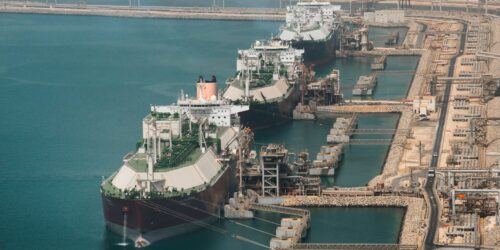Qatar, the world’s biggest exporter of liquefied natural gas, said it’s “unhappy” prices are so high but is producing at maximum capacity.
The comments from Energy Minister Saad Al-Kaabi on Monday come amid a crisis in gas markets, with prices rocketing as supply fails to keep up with soaring demand. Although Qatar is spending billions of dollars to increase output, it has said it will struggle to boost production in the near term.
“We are maxed out,” Al-Kaabi said at an event in Doha, adding that volumes are currently around 80 million tons a year. “We’re just consistent, we’re producing what we can.”
The Persian Gulf state has the world’s lowest production costs thanks to an abundance of easy-to-extract gas, most of it contained in the giant North Field that extends into Iran.
Al-Kaabi reiterated the schedule for a planned expansion of North Field output, despite calls for an earlier ramp-up. Qatar aims to increase LNG output by around 50% by 2027, a project that will cost almost $30 billion.
The global energy crunch has worsened as the northern hemisphere enters its winter heating season. Gas flows from Russia and Norway have been limited, while low wind output has increased demand for gas-fired power. Stockpiles of the fuel in Europe are at their lowest seasonal level for more than a decade, and prices are up fourfold since the start of the year.
“I’m unhappy about gas prices,” Al-Kaabi said. “If the customer is unhappy, he’s not going to buy.”
Prices pulled back in recent days after key supplier Russia said it could potentially ship record volumes of gas to Europe this year. But Al-Kaabi said he’s still “worried about the winter. Storage is quite low in Europe, in many places around the world.”
The U.S., where gas prices have climbed rapidly this month but are still far lower than those in Europe and Asia, will soon start to come under pressure, he said.
Al-Kaabi ruled out energy-asset sales similar to those in Saudi Arabia and the United Arab Emirates. The two countries have raised billions of dollars by divesting stakes in pipelines and property owned by their state oil companies.







